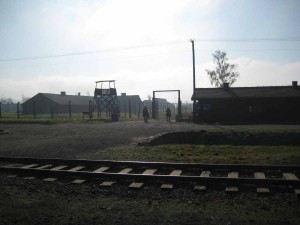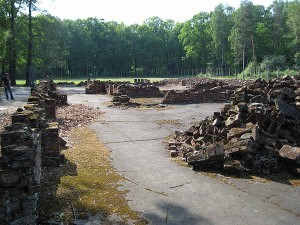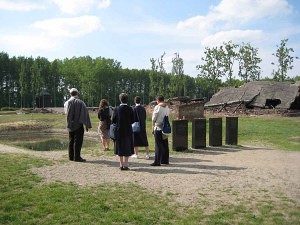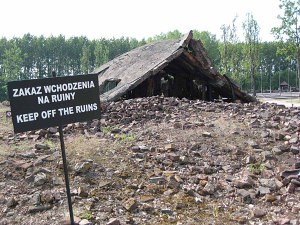A Buddhist Jew’s Pilgrimages to Auschwitz
 The bus from Krakow to the town of Oswiecim, the Polish town the Germans called Auschwitz, jostled wildly on badly pitted roads. As we approached, a vibration like an electrical charge moved through me starting from my feet. In a few minutes we would arrive at the place where over a million Jews, and members of my family, were murdered.
The bus from Krakow to the town of Oswiecim, the Polish town the Germans called Auschwitz, jostled wildly on badly pitted roads. As we approached, a vibration like an electrical charge moved through me starting from my feet. In a few minutes we would arrive at the place where over a million Jews, and members of my family, were murdered.
I crossed the parking lot full of tourist buses and found my way into the low information building outside the metal gate adorned with the infamous words “Arbeit Macht Frei.” There was never a time I didn’t know about the Holocaust. It was inherited knowledge, mother’s milk, always there in the background, even before interviewing my mother in the ninth grade, though I had never studied it. Auschwitz was now a state museum with informative signage throughout, and free admission. Yet I noticed everyone paid for a group tour, myself included, in their language of choice. Like children, we wanted someone to lead us by the hand. Just to be in this place was intimidating.
As we walked inside the red brick buildings, once Polish military barracks, of Auschwitz-I, the first component of the Auschwitz complex, at first I felt cool and self-contained. Nothing here seemed new to me and I was convinced none of it would shock me. The displays of suitcases, shoes, eyeglasses, mountains of human hair slowly turning to dust—only random samplings naturally—certainly they weren’t my mother’s or my grandmother’s. They were there to evoke a response and I refused to be one of Pavlov’s dogs. Still, something creeps in when one look at objects, intimate possessions, remnants of what was stripped from people, even in a display window. Gradually, tiny explosions of grief and tears found their way into my throat, seemingly from nowhere. I wondered if these eruptions were sparked by the people around me, since I often absorbed the emotions of others.
After my mother died in 1998, my cousin Regina, who lived down the hall from my parents in Miami Beach, told me two things my mother had said to her. After their arrival at Auschwitz, my mother had brought my grandmother clothes so she wouldn’t be humiliated by standing in line for the gas chamber, naked, for hours or days. The second was that my mother chopped off her own hair to make herself as unattractive as possible to the Nazis. Both details only raised more questions. Perhaps Regina had misunderstood or remembered wrong. Once segregated, prisoners never saw each other again. And hair was forcibly cut after selection using razors and blunt instruments that jabbed and stung. Perhaps my mother had cut it off in the train, knowing what Nazis sometimes did with young attractive women.
The museum of Auschwitz-I with its samples behind glass, its diagrams and maps, even its ovens, was somehow still manageable. Birkenau, a mile and half away, by its sheer scale and vastness was something else. With only a few wooden barracks remaining or reconstructed, it had a chilling anonymity, absolute in both purpose and method. It was monumental, beyond conception. Here there was no sense of gradual, developmental human presence. It was the physical remainder of an efficient machine with one sole purpose—the final solution.
 In the outlying areas of Birkenau stood birch trees and greenery with a confusingly peaceful feeling. Birkenau’s expanse made it hard to hold on to any reference points. It was like being at the ocean where something enormous starts to envelop you. A kind of cosmic presence. Despite thousands of tourists passing through, it was a realm of its own.
In the outlying areas of Birkenau stood birch trees and greenery with a confusingly peaceful feeling. Birkenau’s expanse made it hard to hold on to any reference points. It was like being at the ocean where something enormous starts to envelop you. A kind of cosmic presence. Despite thousands of tourists passing through, it was a realm of its own.
Late in the afternoon, I returned to Krakow and my room at the Wrona. That night I was shaky. I didn’t feel safe. It echoed a theme that had followed me all my life and driven my spiritual path. Sometimes I trusted in a basic ground of wholeness; I could handle challenges, take things in stride. Other times a seemingly opposite force became stronger. Now the absence of trust took over like a dark hole, consuming whatever it was that made me feel human. The subtle thread that made life worth living felt severed like limbs torn from an insect.
The next morning, the implosion continued. I had lost a fundamental sense of my own being or worth. How could I go forward without any spark of trust in myself? Inside something kept spinning, heightening my sense of isolation. Space closed in; I felt paralyzed.
I wondered about the opposite of low self-worth—the inflated sense of Nazi superiority. Instead of paralysis, it had created perfectly executed mechanisms for degrading people, starving them, killing them. They were opposing parallel universes, the nullifying poison of low self-worth and the fantasy of racial superiority exactly calibrated to match. What kind of warped mirror joined them?
A week later I travelled to Auschwitz again, this time from Lodz, taking local trains that stopped at every village, and changing in a town no one had heard of. This was not a route for tourists. Though my courage had grown, I had no idea the journey would be so complicated.
As my second train approached Oswiecim, an older Polish man holding a bundle wrapped in brown paper kept eye contact with me and signaled discreetly when it was time to get off. Perhaps he recognized a pilgrim. His quiet presence gave me the feeling he knew everything about me, and was placed there just to help me. Or were kind-hearted people simply abundant in Poland? The latter notion, of a Poland full of kind-hearted people, might have shocked or offended my parents’ contemporaries. Their negative depiction of Poles had managed to permeate even the second generation of American Jews. My experience differed, but that was no surprise—I’d been disloyal in larger ways.
From the train station I took a taxi to the Centre for Dialogue and Prayer where I would stay. Less than a five minute walk from the perimeter of Auschwitz-I, the Catholic institution hosted visitors to Auschwitz and educational events. Eighteen German teenagers were also in residence, on a school visit. The woman at the front desk seemed cold and guarded; the students blasé and disinterested if not downright arrogant. I wondered how much had to do with summoning extra defenses in order to be at Auschwitz.
Empty hallways amplified the voices of cleaning ladies bellowing outside my immaculate room, scrubbing everything meticulously. There was nothing earthy here, barely anything Polish. I couldn’t help resenting the sterility of this Catholic institution next to the place where unimaginable desecration of human life had taken place in filth and stench. To students and streams of visitors, Auschwitz might be an official museum, but not to me.
The next morning I meditated alone in my room. I recited some aspiration prayers and then sat for a while, letting whatever needed to come to the surface be present. I felt the weight of being here, and a sense of helplessness. In the larger scheme of things, my being here made no difference at all, so why did it matter? What was the point of my trying to understand? And if I did, how would that help anyone else? The worthlessness that had forever infected me had fully de-cloaked. What was any human being’s worth in the face of a totality that doesn’t blink when millions are murdered?
Hopelessness mingled with my teacher’s words in front of me, a teaching on the genuine mind of sadness. This sadness was without complaint, free from depression. It touched the pure, still center of my heart and opened the place where nothing needed to be held back. Tears did the work from there, like a cosmic washing machine, leaving me naked and available.
I settled more deeply, and a fleeting image came of thousands of white beings in the space above me. Did I imagine it? Then an effusion of love—a sense of these beings wanting to help me. The feeling repeated like waves hitting the shore. From above my head a weight pressed down, not uncomfortably. A similar weight ran through my body and into my arms and legs, strong and steady. I sensed a bank of energy radiating around me like a monolith of gold. Perhaps I would not be visiting Auschwitz alone.
As I walked to Auschwitz after lunch, I noticed people sunbathing and swimming by the river just behind the camp. It was some kind of holiday. The purity of the water next to the beach of rocks penetrated me as I listened to its gentle warbling. The water moved briskly; nothing was stagnant. I picked up a few rocks and put them in my pocket. As I left the river bank a puppy ran over to greet me, wagging its tail deliriously. I knelt down and tears streamed down my cheeks. His owners were grilling hot dogs, their faces fixed in an altogether different reality.
At the main gate to Birkenau, I needed the bathroom and followed the sign for ‘WC’. Two children pushed in front of me and suddenly my heart was pierced, aflame with anger and hurt. I had no idea how raw and vulnerable I was. While I might never know how many other family members, friends and neighbors, were murdered here, I knew for certain my grandmother had. This was my family’s graveyard and I needed this respected. At least I should not be mistreated. Still standing at the entry, a lifetime of detachment was falling away.
I dried my face with an old tissue, and climbed the stairs to the tower overlooking the camp, the faces around me like hard plaster masks. I collected myself and then went back down. Following the railroad tracks that once carried trainloads of prisoners for selection, I walked to the large monument at the opposite end of the camp from the entrance. A guide in her late forties was just finishing her tour in English. I lingered and then asked her if there were any archives on-site explaining that my mother and her family had been inmates.
“Where did they come from?” she asked.
“Lodz,” I replied.
“So they arrived in August of 1944,” she said definitively. I hadn’t known that.
“Yes, you should go to the archive office at Auschwitz-I and give them whatever information you have about your family.”
I thanked her and said I would. Then I walked to the farthest corner of  Birkenau where countless bodies had been burned in the open air. I found a spot under a tree, facing an open field where their ashes had been spread. Using a brick from the remains of one of the gas chambers as a platform, I lit a piece of charcoal and burned some juniper. The smoke supposedly created a stairway for the dralas to descend, but it also signaled my heart to open at least enough to allow the possibility of perceiving them. Was the smoke really inviting anyone? Or was it a trick?a catalyst for opening the heart? Perhaps it was both.
Birkenau where countless bodies had been burned in the open air. I found a spot under a tree, facing an open field where their ashes had been spread. Using a brick from the remains of one of the gas chambers as a platform, I lit a piece of charcoal and burned some juniper. The smoke supposedly created a stairway for the dralas to descend, but it also signaled my heart to open at least enough to allow the possibility of perceiving them. Was the smoke really inviting anyone? Or was it a trick?a catalyst for opening the heart? Perhaps it was both.
With me were the river rocks, shells from the Baltic Sea next to Gdansk, and salt from the mines I had visited near Krakow—they carried the connection to the land which I shared with my ancestors, the land which joined us.
I chanted the opening verses from the The Sadhana of Mahamudra, a practice composed by my teacher. The verses seemed to have been written for this very moment; a poetry of despair that opened to a longing within. My mind steadied. Anxiety over what to do, how to be, dropped away. I relaxed into simply making the gesture, offering it without expecting a result. I melted into just being there, the ground of Birkenau beneath me, birds singing. It was peaceful here, next to the forest, almost idyllic. The ambitious struggle to accomplish something dissolved into simplicity and presence.
After practicing I continued walking and came upon Crematoriums IV and V, and a pond into which ashes of the dead were dumped. I placed rock salt  and shells on the black marble monuments nearby and threw salt into the pond. Something seemed different at Crematorium IV. I felt a softly vibrating presence. I sensed my grandmother, Etla, whole and intact, and felt her love and encouragement. Still, in the presence of so much death, l wondered how just being here could be enough. There had to be more I could do to help. But what?
and shells on the black marble monuments nearby and threw salt into the pond. Something seemed different at Crematorium IV. I felt a softly vibrating presence. I sensed my grandmother, Etla, whole and intact, and felt her love and encouragement. Still, in the presence of so much death, l wondered how just being here could be enough. There had to be more I could do to help. But what?
Looking at my watch, I started running back toward the main gate to catch the 4:00 pm bus back to Auschwitz-I. The strap of my left sandal broke, slowing me down and I realized there was no way I could get back in time. Ahead of me were the voices of a man and a woman, unmistakably American. I lurched ahead to catch up and asked if they had a car. Could they give me a lift back? Coolly they hesitated, barely willing to look at me.
“Well, yes, I suppose so,” said the man.
Relieved, I lagged behind them until we reached the parking lot. After climbing into their back seat, I asked where they were from.
“From Colorado, Fort Collins” the woman replied.
“What do you know, I’m from Boulder,” I said. The spell of distance was broken.
“I just have one question,” the blonde woman said. “Can you explain to me why they singled out the Jews? No one seems to be able to tell me that.”
I ought to have an answer. Didn’t I? What came out of my mouth seemed anemic.
“I guess sometimes people feel they need to blame a certain group for their problems.”
There had to be more. Something to do with Jews being homeless wanderers, keeping to themselves on borrowed lands for centuries, minding their own affairs, especially around Easter when they could be attacked for supposedly killing Christ, or for the fictitious spilling of Christian children’s blood to make matzah. Jews were mysterious and easy targets. I only knew I carried the sense of something like a black mark inside me, a sense of something hateful for being Jewish.
Back in my room, I took a shower and then walked back to the river. The sweet Polish breeze filled my senses. Were my ancestors gently whispering something I needed to know? Something in the air was so gentle, the smell of the earth and plants intoxicated me. I only needed to be near the smallest patch of grass to feel it. A calm well-being embraced me as night fell. I would make an offering to my grandmother before departing the next day.
As I walked through the entrance to Birkenau the next morning, I stopped, smelling smoke. It happened wherever I went in Poland—someone burning trash? This time the familiar smell carried something else, welcoming me sweetly. It lasted only a moment, but was unmistakable. I felt my grandmother reaching toward me.
With a strange collection of offerings, I found a spot on the ground next to Crematorium IV and carefully laid them down. I knew a custodian was sure to notice and remove them within a day, but I needed to leave something of myself. The arrangement included a rock from the river, a few shells, a stick of incense, some salt, flowers, my broken sandals, and a note. I have since forgotten the contents. It started with Hello dear grandmother. I am Masza’s daughter, your grandchild. Perhaps that was all.
2011 Bearing Witness Retreat
For years I’d heard about the Zen Peacemakers annual Bearing Witness Retreat at Auschwitz-Birkenau. Though I had already visited Auschwitz three times, at the last minute I signed up.
Roshi Bernie Glassman welcomed us on the first evening. His instructions were sparse and hit the mark: the teacher of the retreat was Auschwitz. The five-day retreat began with detailed tours through the “museum,” immersing everyone in the sea of information that can only make a sane human being begin to feel insane. The progressive overwhelm was compounded by the fact that we were a hundred people from different backgrounds, including Poles, Germans, Jews, Israelis, Palestinians, Americans, and Native Americans—each person with a different reason for being there—each with a different wound.
The three tenets of the Peacemaker order were Not Knowing, Bearing Witness and Loving Action. Not knowing was having no answers or  plan—something I was already acquainted with. Bearing witness to the past took the form of meditating alongside the selection site at Birkenau while taking turns reading names of the dead aloud for several hours a day. Bearing witness to the present included small daily council circles before breakfast where we shared our feelings and experiences. The council circles were the only mandatory part of the schedule and, in a way, the most excruciating. Finally, Loving Action was the natural, uncontrived response arising from the first two.
plan—something I was already acquainted with. Bearing witness to the past took the form of meditating alongside the selection site at Birkenau while taking turns reading names of the dead aloud for several hours a day. Bearing witness to the present included small daily council circles before breakfast where we shared our feelings and experiences. The council circles were the only mandatory part of the schedule and, in a way, the most excruciating. Finally, Loving Action was the natural, uncontrived response arising from the first two.
People assumed we were here to acknowledge and pay respects to events of the past. But Auschwitz dredged up shadows of the present—the sense of one person having more or less value than another—the sense of isolation, and of being other. It not only heightened the perception of one’s own pain, but everyone else’s. As feelings rose to the surface, the flimsy veils of distance and rational thought came unglued.
Faced with my familiar personal issues of not being seen, not finding my place, I simultaneously embraced the trembling fears of German hands grasping mine as we walked together through Birkenau. Auschwitz was indeed a powerful teacher, illuminating whatever one tried to ignore or conceal, as only extreme darkness could do. The past spilled into the present, and the present spilled into the past. Nothing ever really vanished.
In addition to Bernie, the spirit leaders included his wife Eve Marko who guided the Buddhist contingent, Father Manfred Deselaers, the Catholic priest I’d met on my first visit in 2006, and a guitar-carrying Israeli rabbi named Ohad Ezrahi, himself a BuJu who wore a mala.
Since I’d inhaled enough Buddhism to last lifetimes, I followed Ohad around, or rather I followed the sound of his guitar and nigunem—the sweet wordless melodies we sang in lieu of prayers in dark wooden barracks, or standing in the trees where naked bodies had huddled together waiting to enter the gas chambers. Somewhere inside I knew those melodies. Was it imagination or memory that my godless father had sung them—or a far earlier memory? Hearing even one, it seemed like some place inside me knew them all.
Even though I felt deeply aligned with the three tenets of Zen Peacemaking, something in me felt out of place. Except for those sweet wordless melodies, my sense of belonging seemed fragile at best. There was something I still needed to find out. I suspected it would happen later, in its own time.